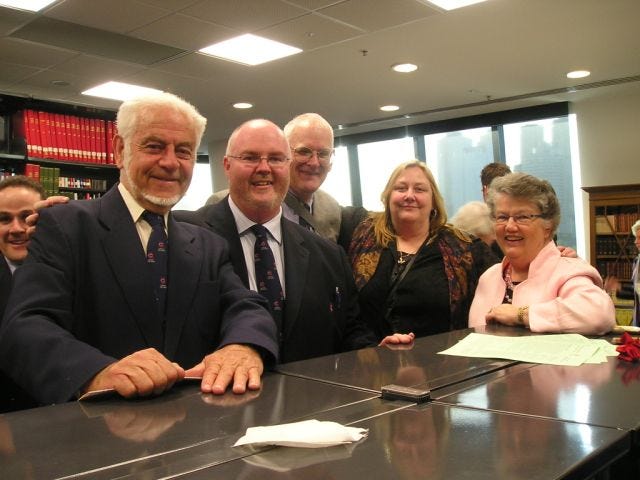King David
GH on a human treasure of the book world...and his appalling treatment
I have seldom encountered anyone, in any walk of life, who so completely fitted their job as David Studham, the librarian of the Melbourne Cricket Club. Temperamentally, technically and intellectually, he has been the consummate custodian of one of the world’s best sporting libraries - the WG Grace of such institutions, as I argued on its sesquicentenary in November 2023.

Although the library is in the precinct of the great stadium, David has always been deeply invested in the idea of the MCC being a private club with public responsibilities, a philosophy he credits to former presidents like Don Cordner, Bruce Church and Paul Sheahan. MCC’s library is more accessible and responsive than most community counterparts. Despite not being a member, I’ve been a regular user since the late 1980s. My work has been enriched by its expansion and improvement, and my person by David’s signature date slice at morning tea. Emerson wrote that ‘an institution is the lengthened shadow of one man.’ In the case of the MCC library, David is that man. Its environs manage to be both dignified and welcoming; his astonishingly expert staff wear their learning lightly. I have always taken pleasure in the MCC’s esprit de corps, in the ranks of its two hundred volunteers, who cherish the club so dearly. When a tour stops in at the library, you can hear the pride and awe in the guides’ voices. When a journalist has wanted to evoke the MCG’s antiquity and heritage, it’s been David to whom they have turned.
Now after thirty-one years, David is leaving the Melbourne Cricket Club, for reasons nobody cares to explain. For the last two weeks, I have been receiving calls from colleagues who toil in the vineyards of sports history asking what is going on. Everyone knows David; everyone loves David; everyone has benefited at some stage by his decency, his generosity and his eclecticism, his interests stretching from heraldry to comics.
David assembled the definitive book of Ashes iconography, and has edited the library’s marvellous periodical The Yorker; he is the guru of women’s cricket, thanks in part to a family connection with Betty Wilson. In the ordinary course of business, I receive many historical enquiries. Some I can answer but most I cannot, and David has over the decades been an infallible backstop. He is sport literature’s Encyclopedia Brown; imagine how much goodwill David has generated for the club by the zeal and alacrity with which he’s met public curiosity. Members of the MCC, meanwhile, honestly don’t know how good they’ve got it. When Wimbledon is on, the library at the All-England Club simply closes; on cricket and football match days, Melbourne members throng their library, rove its stacks, rejoice in its riches. Now what?
Last week I attended David’s small and low-key farewell. Nobody senior from the club was in attendance. No message of appreciation was read. No presentation was made. Nobody wanted to talk about why David was leaving. He is constrained - would you believe it? - by the bully’s weapon of a non-disclosure agreement. Seriously? As though David, the epitome of institutional loyalty, would traduce the place that has been such a huge part of his life, and, for that matter, his family’s.
I find this disturbing. I sense that David’s way of doing things - personal, courteous, scholarly but communal - is at odds with MCC’s trend to managerialism, its mirroring of the AFL-industrial complex, its evolving from the soi-disant ‘people’s ground’ into a slick but generic corporate hospitality machine. I worry for sports history too, increasingly of interest to the bean counters only insofar as it can repackaged and flogged. It was after a conference at the MCG forty-two years ago that the Australian Society for Sports History was founded; the ground is to host the sesquicentenary of Test cricket. In this, David would have been in his element. Is the library’s future even assured? You could sell a lot of $11 Crown Lagers in the space it occupies. The scandalous indifference with which this great servant has been treated offers no assurances.



"Is the library’s future even assured?" I would bloody well hope so. On match days I was often fascinated by the array of people in the library. Young, old, some with ties on, some with shorts on, male, female and for some like me, it was probably their only visit to a library in who knows when. Though it was the MCC's library, and thus may have come with with a high degree of stuffiness, instead it always had that welcoming feel, which I expect was down to David and the rest of the library staff. Whatever you're up to David in the future, good luck and thanks.
This is seriously disturbing, Gideon. I have been using the MCC Library since Rex Harcourt and Ross Peacock convened the ASSH conference in 1983 and make it a point of call every time I’m in Melbourne and each day of the Boxing Day Tests which I’ve been attending since 1997. David and the library have been a beacon of world sports history for the last 30 years. I’m giving a talk on Cricket and War for the Alexandra Club on 26 March and about three weeks ago contacted David to see if he could assist with images of military uses of the MCG during WW2. A few hours later he sent me half a dozen shots of the American Army Air Force and the RAAF which will greatly assist my presentation, just a recent example of the importance of the library’s resources and the first-class device it provides.